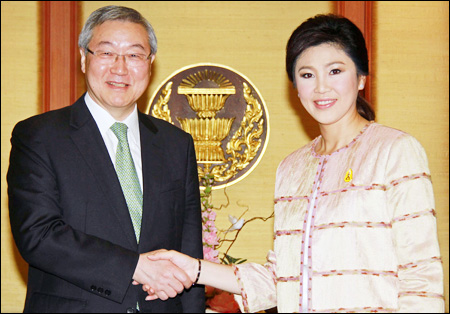Incompetent!

Foreign Minister Kim Sung-hwan, left, shakes hands with Thai Prime Minister Yingluck Shinawatra during their meeting at Parliament in Bangkok, Tuesday. Kim is visiting the Southeast Asian nation to strengthen relationships between the two countries.
Foreign ministry runs out of tricks to deal with big powers
Does Korea have diplomacy it can call its own?
If so, the next question would be what has the Ministry of Foreign Affairs and Trade been doing. Whenever a diplomatic row surfaces, it cites strategic ambiguity or quiet diplomacy, implying that it is doing its best behind the scenes.
However, the latest case of Chinese fishermen’s piracy in the West Sea raises questions about whether the ministry has been doing its job properly.
On Monday, Chinese fishermen armed with knives, axes and sickles wounded four fisheries inspectors who were attempting to board their vessel.
Low-ranking Chinese diplomats were called in Tuesday and given a slap on the wrist.
The incident was embarrassing because only on March 26, Korea and China agreed in a summit to find an amicable settlement for illegal fishing by Chinese fishermen in Korean waters, following the murder of a Korean coastguard by a Chinese fisherman who resisted an onboard inspection in December.
This is not an isolated case.
When Japan went ahead and included its claim to Dokdo, Korea’s easternmost islets, in its school textbooks, the ministry reacted as if it was not a big deal, saying that the move had been anticipated.
About its failure to have the world accept the dual use of the East Sea together with the Sea of Japan for the waters separating Japan from Korea, by all appearances, efforts were made to make it look as if it was not a loss in a diplomatic war with Japan.
Its practices with China, its biggest trading partner, and Japan, the world’s No. 3 economic power, captured the spirit of weak man’s diplomacy _ looking the other way when it should speak out.
“We call for sincere measures to be taken by China,” said Han Hye-jin, vice-spokeswoman at the foreign ministry, during a briefing. “We have conveyed to the Chinese Embassy in Korea our stance on the need for continued mutual cooperation in the case.”
Foreign ministry officials claim that Beijing has lately been cooperative in dealing with the illegal fishing issue and that Chinese authorities have been trying their best to prevent tragic incidents from recurring.
But some disagree.
“The Chinese government is purposely not controlling the illegal Chinese fishing boats in the West Sea. So it is wrong for the foreign ministry to say that Beijing is exerting all its efforts to solve the case,” said an expert at a governmental body requesting anonymity. “China has a tendency to take advantage of the weakness of neighboring countries.”
After the incident took place, a Chinese official was quoted as saying by Huanqiu, China’s newspaper for global affairs, that “Korea should assure the safety of the four captured Chinese fishermen and respect their legal rights and interests.”
Chinese fishermen’s illegal fishing in the waters near the maritime border has flourished since the 1990s after a sharp decline of fisheries stocks in China’s waters due to pollution and over fishing.
The South Korea-China fishery pact that came into effect in 2001 has remained virtually toothless as it didn’t specify on the use of the overlapping area of the two countries’ exclusive economic zones (EEZ).
The relatively short width of the West Sea _ the distance between South Korea and China there is 280 nautical miles _ has led to the overlapping of the two countries’ EEZ claims.
Governments claim their own sovereign rights and resources control in an EEZ up to 200 nautical miles from their coastlines.
South Korean officials have inspected 110 Chinese boats this year alone which are illegally fishing in the waters.
Illegal Chinese fishing remains a bone of contention between the two nations as it has led to numerous diplomatic spats.
Experts here claim nothing has changed since Chinese President Hu Jintao promised President Lee Myung-bak to strengthen the overseeing of the fisheries after the death of Lee Cheong-ho last December.
Lee, the coastguard, was stabbed to death by a Chinese fisherman while inspecting the latter’s vessel. They therefore claim it is time for Seoul to rethink its stance in dealing with Beijing.
Beijing has lately been taking an over-assertive attitude toward its neighbors concerning diplomatic disputes following its growing economic power.
In 2010, China blocked exports of rare-earth elements to Japan following a territorial spat over the disputed islands in the East China Sea, called Senkaku by Japan and Diaoyu by China. <Korea Times/Chung Min-uck>



















































